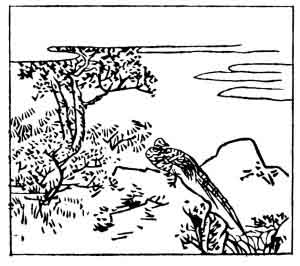
LONG is the mountain pheasant's tail
That curves down in its flight;
But longer still, it seems to me,
Left in my lonely plight,
Is this unending night.
The writer was a foundling, picked up and adopted by Abaye at the foot of a persimmon tree, which is in Japanese kaki, from which he got his name. He was an attendant on the Emperor Mommu, who reigned A.D. 697-707, and was one of the great poets of the early days of Japan; he is known as the rival of Akahito Yamabe (see next verse), and after death was deified as a God of Poetry. There is a temple erected in his honour at Ichi-no-Moto, and another at Akashi, not far from Kobe; he died in the year 737.
In the fourth line nagashi may be taken as the adjective 'long', or the verb 'to drift along'; and yo may mean either 'night' or 'life'; so that this line, which I have taken as 'long, long is the night', may also mean 'my life is drifting, drifting along'. Yamadori (pheasant) is literally 'mountain bird', and ashibiki is a pillow-word for mountain, which is itself the first half of the word for pheasant.